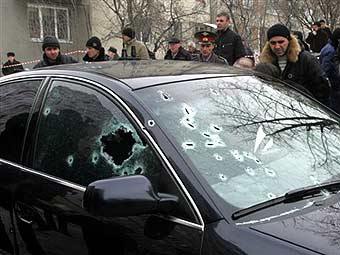
Was the FSB Behind the Murder of Vladikavkaz’s Mayors?
Publication: North Caucasus Weekly Volume: 10 Issue: 12
By:

On March 12, Russia’s Investigative Committee announced the names of the suspects who killed both the acting and the former mayor of the capital of North Ossetia, Vladikavkaz, as well as several top police officials last year. Nine people are accused of committing the crimes; three of them have been arrested while international arrest warrants have been issued for the rest (Vremya Novostei, March 13).
At least two among the murder suspects worked for the law-enforcement agencies of North Ossetia—the prosecutor’s office and the anti-organized crime police department. The fact that members of law-enforcement agencies are accused of taking part in the high profile killings suggests it is unlikely that the police have randomly assigned the suspects the role of having committed the crimes, as often happens in similar cases in Russia.
A sniper killed the mayor of Vladikavkaz, Vitaly Karaev, on the threshold of his house last November 26 (RIA Novosti, November 26, 2008). One month later his predecessor, Kazbek Pagiev, who had just been discharged from the vice-premier’s position, was gunned down, also near his home (Newsru.com, December 31, 2008). The two consecutive murders of the top North Ossetian officials sent the republic into an uproar, given that it was the first time in the history of the republic that it had experienced the killing of high-profile officials like these.
Vitaly Karaev was known as a very close associate of the head of the republic, Taimuraz Mamsurov, and unsurprisingly, Mamsurov was infuriated by the killing. North Ossetia’s unpopular interior minister was quickly dismissed and federal agencies vowed to find the perpetrators.
The day after Karaev’s murder, the Chechen separatist website Kavkaz-Center claimed to have received a letter from the Ossetian Jamaat militant group that claimed responsibility for Karaev’s killing (Kavkazcenter.com, November 27, 2008). According to the jamaat’s statement, the Ossetian Muslims were upset by the way Muslim women were harassed in public places in North Ossetia on Karaev’s orders. Yet, sources in the republican police dismissed such claims and did not take them seriously (Lenta.ru, November 27, 2008).
The unveiled personalities of the killers suggest that the Ossetian Jamaat and Muslims in general had nothing to do with the killing of the mayors. All but one of the suspects has South Ossetian origins, which suggests that they were not even Muslims. Instead the Federal Security Service (FSB) may have been behind the killings, as the above and some additional facts suggest. Not only were there two servicemen among the killers, but one of them stepped down from his position shortly after the murder of the ex-mayor, which looks less like fleeing the scene of the crime than an orderly evacuation (Vremya Novostei, March 13).
Even though Kavkaz-Center has not been known for its accuracy and impartiality, it certainly required substantial expertise to feed the website the information about the Ossetian Jamaat’s involvement—the kind of expertise normally found in the security services. The North Ossetian branch of the FSB has remained unusually quiet regarding the two-high profile killings, and this may mean that they were not allowed to interfere with the investigation. The FSB displayed hyperactivity in other fields at the same time. The agency made an unprecedented announcement about the imminent danger of terrorist attacks in North Ossetia, featuring photographs and full details of the three suspects, one of them being a former police officer (Region15.ru, February 6). The public still does not know where these terrorists disappeared to, even though there was an inconclusive claim that they were killed in Ingushetia (Regnum information agency, February 14).
It is completely logical for authorities to claim that those involved in this operation were almost exclusively South Ossetians. The Ossetian people are divided into three major sub-ethnic groups and for security reasons it is safer to use one of the groups against the other. Both of the mayors belonged to a group not originating from South Ossetia.
Besides, killing off unwelcome characters is not something new for the security services in the Caucasus. For example, a number of the postwar field commanders in South Ossetia following the Georgian-South Ossetian conflict in the beginning of the 1990s were reportedly killed with direct involvement of the Russian security services. More recently, because of the widespread engagement of the Russian security services in South Ossetia in the run up to the August war with Georgia, South Ossetians developed especially close links with these organizations.
It is difficult to grasp why Karaev or Pagiev would have been particularly disliked by the FSB. People in the know in North Ossetia claim that the head of the republic, Taimuraz Mamsurov, has uneasy relations with the FSB for various reasons, which suggest that the killing of Karaev may have been directed against Mamsurov, as might have been an earlier attempt on the life of another close associate, Sergei Takoev (Lenta.ru, January 28).
The success of the investigators is perhaps partly explained by the pressure that Mamsurov exerted on them. In a revealing statement, Mamsurov provided a glimpse into what may have been going on behind the scenes. “When we talk about the brazen behavior of the murderers, who go about their business in the republic and in the broad daylight do whatever they want, when economic crimes are committed, when you and me, our people, are robbed, excessive delicacy and looking to the federal laws [for help] ought not take place,” he said (North Ossetian government’ official website, February 4).
The suspects who have been declared fugitives from justice will probably never be found and even those who have been arrested will not receive real sentences. Nevertheless, these events may be indicative of the FSB’s declining power, or at least those of its branches that have been pursuing especially brazen policies in the North Caucasus, and changing the balance of power in the security services and at the same time increasing the local governors’ power.




